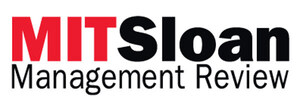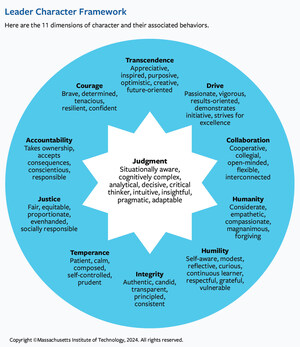MIT Sloan Management Review announces its new (Re)Learn to Lead series, offering insight from prominent experts into how business leaders must evolve in a digital world.
(Re)Learn to Lead presents ideas from Deborah Ancona, Seth Godin, Herminia Ibarra, Whitney Johnson, and Boris Groysberg and Tricia Gregg.
CAMBRIDGE, Mass., Oct. 28, 2019 /PRNewswire/ -- MIT Sloan Management Review (MIT SMR) announced today the launch of (Re)Learn to Lead, a series that distills wisdom from prominent experts on the future of leadership in a changing world
"This series comes at a pivotal moment," says Lisa Burrell, editorial director at MIT Sloan Management Review. "Because businesses are competing in such a rapidly changing environment, leaders who continue to rely on yesterday's tired approaches risk extinction for their companies and for themselves. Our objective is to help them find a viable, productive way forward with their organizations and teams. This series offers new frameworks and insights from some of the foremost thinkers on leadership and organizational behavior."
(Re)Learn to Lead is a weeklong series, with daily installments from October 28 through November 1. It tackles issues of immediate importance to leaders in a digital age, such as ceding control to people on the front lines (without courting chaos), making human connections instead of hiding behind the data, having the courage to throw out cherished practices that have become cultural obstacles to transformation, leading virtual teams effectively, and staying deeply involved in the creative and production work of the company in order to lead with an innovator's mindset.
In "Five Rules for Leading In a Digital World," MIT Sloan School of Management professor Deborah Ancona offers a new model for leading in times of flux. Through her research at the MIT Leadership Center, she and her colleagues have discovered that executives who demonstrate five specific behaviors are best equipped to navigate the challenges that lie ahead. In this eye-opening article, she describes how each behavior prepares leaders and their organizations for the future.
Seth Godin — best-selling author, blogger, and founder of the altMBA — offers a fresh and fascinating take on the management-versus-leadership debate in "Leaders Don't Hide Behind Data." He compares the industrial-age manager who tracked people with time clocks and clipboards to present-day bosses who use digital tools and data to monitor and direct employees' every move. He argues that management is actually an outdated activity that prohibits breakthroughs — and that leadership is a more "human" endeavor that will take organizations where they need to go. Says Godin about his article: "We need to make a choice, and it is the choice to walk away from the compliance and control of 'management' and realize that leadership is a totally different way to do our jobs."
In "Take a Wrecking Ball to Your Company's Iconic Practices," London Business School professor Herminia Ibarra challenges leaders to orchestrate a full cultural shift as they pursue digital transformation, by eliminating or dramatically changing their organizations' most cherished practices and rites of passage. "Organizations must unlearn the lessons of years of experience and understand that the very cultural values that made them successful in the past have hardened into iconic practices that are now holding them back," she writes.
Whitney Johnson — author, podcast host, and expert at helping organizations develop high-growth individuals — shares her perspective on how leaders can make the most of a distributed workforce. In "Leading Remotely," she writes: "If we effectively harness the strengths of this workforce while taking steps to minimize the drawbacks, we managers will find ourselves with an extremely motivated team." Johnson offers guidance on how leaders can grapple with problems in several key areas: communication, project management, talent development and management, and reliable access to technology.
In "How Tech CEOs Are Redefining the Top Job," Harvard Business School's Boris Groysberg and his coauthor Tricia Gregg argue that hands-on involvement from CEOs is not a distraction from strategic thinking but rather the future for top leaders across many sectors. The authors describe how pioneering leaders contribute their own expertise to their companies' innovation and production efforts, even as they steer their ships. The analysis focuses on leaders' patenting and publication activity as a proxy for direct involvement in innovation.
The (Re)Learn to Lead series is brought to you by MIT Sloan Executive Education.
About MIT Sloan Management Review
A media company based at the MIT Sloan School of Management, MIT Sloan Management Review's mission is to lead the conversation among research scholars, business executives, and other thought leaders about advances in management practice, especially those shaped by technology, that are transforming how people lead and innovate. MIT Sloan Management Review captures for thoughtful managers the creativity, excitement, and opportunity generated by rapid organizational, technological, and societal change.
About MIT Sloan Executive Education
MIT Sloan Executive Education's portfolio of programs reflect MIT Sloan's core mission—to develop principled, innovative leaders and to generate ideas that advance management practice—in an environment designed to foster extensive peer-to-peer interaction and a wide range of professional and cultural exchanges. Choose from 50+ two-day to week-long programs led by internationally renowned experts
Contact |
|
Emily Lavelle |
|
Emily Lavelle Communications |
|
+1-212-390-1328 |
|
SOURCE MIT Sloan Management Review

Related Links
WANT YOUR COMPANY'S NEWS FEATURED ON PRNEWSWIRE.COM?
Newsrooms &
Influencers
Digital Media
Outlets
Journalists
Opted In





Share this article